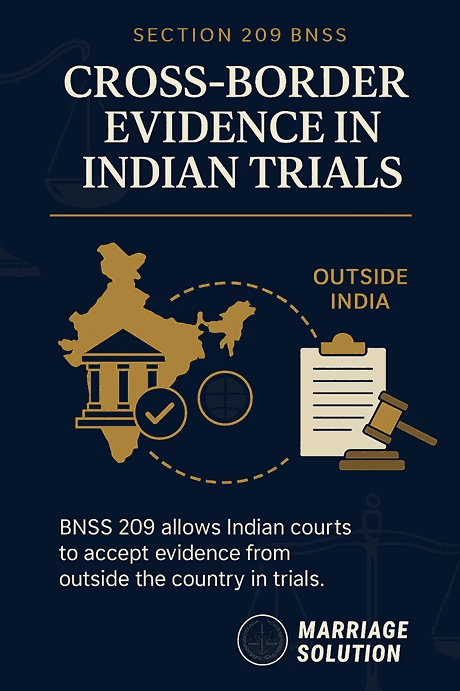Introduction to Section 209 BNSS
BNSS Section 209 provides a mechanism for Indian courts to accept and consider evidence related to offences committed outside India. This provision is important when a person is tried in India for a crime that occurred abroad, ensuring that relevant evidence from the foreign territory is legally admissible in Indian courts. It supports the broader goal of cross-border criminal justice and effective prosecution under international cooperation.

What is BNSS Section 209 ?
Section 209 of the Bharatiya Nagarik Suraksha Sanhita empowers Indian courts to receive depositions or exhibits related to offences committed outside India. These may include physical or electronic records presented before judicial officers, diplomatic representatives, or consular officials abroad. This section complements Section 208, which allows Indian courts to try such offences under specific conditions, and ensures that necessary evidence is not excluded due to geographical barriers.

BNSS Section of 209 in Simple Points
1. Acceptance of Foreign Evidence
This section allows Indian courts to legally accept depositions or exhibits collected in foreign jurisdictions. Whether collected by judicial officers or Indian diplomats, such evidence becomes admissible when the trial is conducted in India under Section 208. This reduces the need for duplicative evidence gathering and saves critical time in international cases.
2. Physical and Electronic Evidence Validity
BNSS 209 explicitly includes both physical and electronic evidence. With the rise of digital communication, crimes often involve emails, electronic documents, or digital witness testimonies. This provision ensures courts can use such materials to uphold justice in cross-border cases.
3. Role of Indian Diplomats and Consuls
Indian diplomatic or consular representatives stationed in foreign territories are authorized to collect or oversee evidence. Their involvement gives the evidence an official status, which is recognized in Indian legal proceedings. This diplomatic participation helps preserve the authenticity and legality of foreign evidence.
4. Linked with Section 208 Trials
This provision only applies if the offence is being tried under Section 208, which deals with offences committed outside India. Section 209 supports Section 208 by ensuring that evidence collected abroad doesn’t lose legal standing simply due to its place of origin. Together, these sections ensure procedural completeness.
5. Discretion of Central Government
The Central Government has discretionary power to direct that such foreign evidence be accepted. This ensures that there is a level of oversight and diplomatic assessment, especially in sensitive or high-profile international cases. This discretion acts as a safeguard to prevent misuse.
Section 209 of BNSS Overview
BNSS Section 209 enables Indian courts to admit evidence collected outside India when trying offences under Section 208. It includes depositions and exhibits in both physical and electronic forms, provided they are received through proper judicial or diplomatic channels and approved by the Central Government. This section facilitates seamless judicial cooperation across borders.
BNSS Section 209 – 10 Key Points
1. Jurisdiction for Foreign Offences
BNSS Section 209 applies when an offence has been committed outside India but is being tried within the country under Section 208. It ensures that even if the crime occurred abroad, the Indian court can proceed with the case. This is crucial for maintaining legal continuity and allowing Indian jurisdiction to operate on global matters. It strengthens the justice system’s capacity to deal with international crimes involving Indian citizens or assets.
2. Role of Central Government
The Central Government has the authority to permit evidence from foreign territories to be used in Indian courts. This discretion ensures that only credible and relevant cross-border evidence is admitted. It avoids unnecessary complications while also maintaining national interest and judicial integrity. Without this power, courts might struggle with foreign cooperation in sensitive cases.
3. Acceptance of Depositions
The section allows Indian courts to accept depositions made before judicial officers in foreign countries. These depositions must relate to the matter being tried in India. This simplifies evidence collection, especially when witnesses or records are physically inaccessible to Indian investigators. It facilitates a smoother trial process and speeds up justice delivery.
4. Inclusion of Exhibits
Apart from depositions, physical or digital exhibits presented in a foreign country can also be used as evidence. These may include documents, recordings, or digital files relevant to the offence. Their inclusion ensures that no critical material is excluded simply due to geography. This provision modernizes the trial process in a globally connected environment.
5. Digital and Electronic Evidence
BNSS 209 explicitly mentions that electronic forms of evidence are acceptable. This is highly relevant in today’s digital age where cybercrimes, online fraud, and virtual communication are common. It empowers courts to use emails, video calls, or scanned records from abroad. This digital openness ensures justice remains relevant in evolving legal landscapes.
6. Judicial and Diplomatic Sources
Only specific sources like judicial officers and diplomatic or consular representatives can provide such foreign evidence. This restriction ensures authenticity and legal validity. It prevents forged or unreliable material from influencing the trial. Trust in the source of evidence is thus preserved through official channels.
7. Alternative to Commissioning Evidence
Ordinarily, courts would issue a commission to collect evidence from abroad. BNSS 209 removes the need for that when verified foreign evidence is already available. This reduces procedural delays and costs. It is especially beneficial in urgent cases where time is critical or travel is impractical.
8. Ensures Continuity of Trial
Section 209 ensures that the trial can proceed smoothly even when key parts of the investigation happened outside India. It maintains the flow of judicial processes and avoids stalling due to international barriers. This legal provision helps bring transnational criminals to justice effectively and efficiently.
9. Strengthens International Legal Cooperation
The section indirectly promotes cooperation between Indian authorities and their foreign counterparts. Knowing that their depositions and exhibits will be accepted, foreign agencies are more willing to assist. This builds a framework of trust and reciprocity in global law enforcement. It also enhances India’s global legal credibility.
10. Balanced Use of Power
The court cannot receive such evidence arbitrarily—it must align with the legal standards of admissibility. The Central Government’s approval adds another layer of scrutiny. This ensures that foreign evidence doesn’t bypass the rights of the accused or the fairness of the trial. Thus, BNSS 209 balances efficiency with justice
Example 1:
An Indian citizen commits cyber fraud while working in Germany. He returns to India, where the case is registered. Under Section 208, the trial begins, and Section 209 allows the Indian court to accept witness statements recorded before a German judge and sent via diplomatic channels.
Example 2:
A crime takes place on an Indian-registered ship docked in international waters. Witness statements and video footage are submitted to the Indian Consulate in Dubai. These documents, certified by the Indian consulate, are accepted under Section 209 for the Indian trial.
Section 209 of BNSS Short Information
| Key Point | Explanation |
|---|---|
| 1. Acceptance of Foreign Evidence | BNSS 209 allows Indian courts to accept depositions or exhibits collected in foreign countries through judges or Indian diplomats, making them valid in Indian trials. |
| 2. Includes Physical and Electronic Records | The section recognizes both physical and digital evidence like emails, recordings, and documents collected abroad, making it suitable for modern, cross-border crimes. |
| 3. Role of Diplomatic Officers | Indian diplomats and consular officials abroad are authorized to gather or verify such evidence, ensuring its authenticity and legal acceptance in India. |
| 4. Connected with Section 208 Trials | Section 209 works together with Section 208, ensuring that trials for crimes committed outside India can use verified evidence gathered from foreign countries. |
| 5. Central Government Approval Required | Before such foreign evidence is accepted, approval from the Central Government is mandatory to ensure legality, security, and proper diplomatic procedure. |
BNSS Section 209 FAQs
BNSS 209
Conclusion
BNSS Section 209 strengthens India’s ability to conduct fair and effective trials for crimes committed outside its borders. It allows Indian courts to accept evidence gathered abroad, including both physical and electronic records, through verified diplomatic or judicial channels. With mandatory Central Government approval, this section ensures authenticity, legality, and smooth cooperation in international criminal cases, complementing Section 208’s global jurisdiction powers.
Need Legal Support?
If you are dealing with court cases, marriage problems, or any other legal issue, our team at Marriage Solution – Lawyer Help is here for you. Simply fill out our quick online enquiry form, and we’ll connect you with the right legal expert to support your needs .
Finished with BNSS Section 209? Continue reading the next sections of the Bharatiya Nagarik Suraksha Sanhita (BNSS), 2023. Each section is explained in easy words, with simple examples, so anyone can understand it clearly.
- Section 210 BNSS : When Can Magistrates Take Cognizance of Offences ?
- Section 211 BNSS : Right to Transfer Case Before Trial .
- Section 212 BNSS : Understanding the Transfer of Cases in Criminal Law .
- Section 213 BNSS : When Can Sessions Court Take Cognizance of a Case?
Full BNSS Section List: https://marriagesolution.in/bnss_section-list/
Full BNS Section List: https://marriagesolution.in/bharatiya-nyaya-sanhita-section-list/
Full IPC Section List: https://marriagesolution.in/ipc-section-list
All Indian Law & Blogs: https://marriagesolution.in/indian-law/
Need Legal Help? Speak to an Experienced Lawyer Now.
Right to Information RTI act :Your Comprehensive Guide (Part 1)
The Right to Information (RTI) Act : Explore the essence of the Right to Information (RTI) Act through this symbolic image. The image features legal documents, emphasizing the importance of transparency and accountability in governance. The scales of justice represent…
What is Article 371 of Indian Constitution ?
Article 371 of the Indian Constitution grants special provisions to specific states and regions within India, addressing their unique historical, social, and cultural circumstances. These provisions aim to accommodate diverse needs and protect cultural identities within the constitutional framework.
Indian Labour law : Your Comprehensive Guide (Part 1)
The purpose of labour laws is to safeguard employees and guarantee equitable treatment at the workplace, encompassing aspects such as remuneration, security, and perks. These regulations establish a secure ambiance by imposing minimum wage requirements, ensuring factory safety measures are…
GST :Your Comprehensive Guide (Part 1 – Understanding the Basics)
The Goods and Services Tax (GST) is like a big change in how we pay taxes in India. It started on July 1, 2017, and it’s here to simplify things. Before GST, we had many different taxes, and it could…





